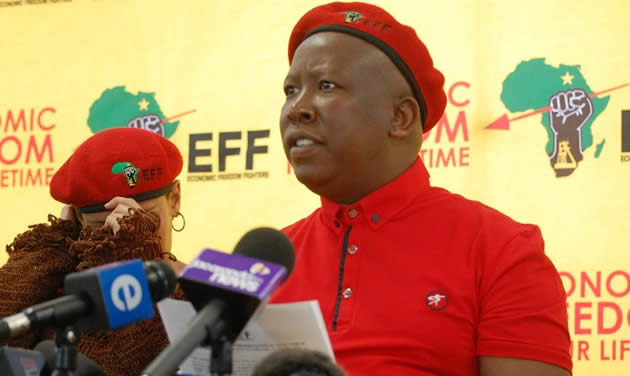Foolishness is not bravery, Mr Malema


Julius Malema
By now the story of one Julius Malema, the controversial opposition South African politician who infamously described zanu-pf members and Zimbabweans in general as coward for failing to remove President Mugabe has been discussed at great length and elicited all manner of responses.
In local parlance, it is a story that you could describe as having been well thrashed and pestled.
We are sure that the greatest winner in all this is the man they call Juju himself who has managed to draw attention to himself — which he enjoys eternally.
There is little doubt Malema is like the proverbial pig that likes to play it dirty, and boy doesn’t it enjoy it!
That is your Malema.
He is in the habit of picking fights with anyone and everyone and this has given him notoriety — the notoriety that we have come to associate him with.
It is this uncanny habit that got him kicked out of ANC, South Africa’s ruling party where he led the Youth League.
He was booted out after picking a fight with President Jacob Zuma, estimating his prowess rather too far for his political clout.
As will be recalled, Malema had been active in the ouster of former President Thabo Mbeki as he fought a political battle along President Zuma.
He infamously declared that he would “kill for Zuma”.
That was in 2008 at Polokwane which now sounds synonymous with that turning point in the history of the ruling ANC.
Three or four short years later, Malema had turned against Zuma.
He gloated that he would unmake Zuma.
He sees himself as a kingmaker.
Instead, he was booted out himself in 2012 en-route to forming his own party, the Economic Freedom Fighters (EFF).
He has been fighting tooth and nail to remove President Zuma through all manner of tricks, including theatrical antics in Parliament where his party has been heckling and disrupting occasions such as the State of the Nation Address.
For these past couple of years, Zuma has been his arch enemy, fighting him in word and deed and often hurling acerbic attacks.
You should watch out for a cartoon by the brutal Jonathan Shapiro aka Zapiro about Malema’s flip-flopping — on everything.
In a classic case of this inconsistency, Malema has just been expressing regret over his role in the ouster of Mbeki.
He said in one instance: “We had too many expectations from a Standard 2 (Grade 4) graduate. We have replaced an economist, Thabo Mbeki, with a Standard 2 graduate,” he said, according to a report, claiming that he was at the forefront of Mbeki’s axing because he and his ANC Youth League leadership were misled, and now the country was paying for that mistake.
“We are in a mess because we removed Mbeki and replaced him with nothing,” he was quoted as saying.
Just recently, Malema has turned onto President Mugabe — a man he once lionised for the heroic land reform.
He says our President must go, utterances that have been received with contempt from the millions of Zimbabweans who have faith in President Mugabe and continue to trust him with party and national leadership.
Malema has predictably received plaudits from opposition circles.
But who cares?
Malema’s words ring hollow — and they will not change anything not least because he does not have any power to change things in Zimbabwe.
Worthier and mightier detractors have been around longer than Malema.
They will probably outlive him — and in turn be outlived by the proud and sovereign people of Zimbabwe.
Malema is just one barking dog.
He is a young man of a troubled background who is ever angry.
He is a case for psychologists.
Perhaps we should pity him and his histrionics.
It is not lost to us that Malema is a deluded fellow: he tends to mistake folly with bravery.
Give him time, we will see him give us another flip!
Fiasco, what fiasco?
Let’s come back home.
When we saw the Zimbabwe Independent lead story proclaiming boldly, “Bond notes fiasco: importers stranded”, we were curious to find out what was going on.
A fiasco is defined as an embarrassing failure.
So we wanted to read in what way the bond notes had become a fiasco.
It turned out the essence of the story was a fraud. It was trying to fulfil the paper’s professed position against bond notes.
True, there are payment bottlenecks.
True, there are businesspeople and banks who reject bond notes.
At times their reasons are understandable, except of course to the obtuse Zimbabwe Independent which can’t differentiate between a cause and effect.
The reason banks and some businesses demand US dollars is because they want to import goods or raw materials. They can’t do that in bond notes. Malawi can’t import using Kwacha, neither can Zambia. Nor can South Africa import from overseas using the rand. The same goes for bond notes — they are not convertible on the international markets. That’s why everyone everywhere wants US dollars, not just Zimbabwe.
What Zimbabwe currently doesn’t have are sufficient US dollars to meet import requirements and that has nothing to do with bond notes but everything to do with sluggish exports.
The bond notes were never introduced to be used to import goods, NEVER.
They were introduced to minimise the public’s access to US dollars which were being wantonly externalised by economic saboteurs.
American dollars are a foreign currency, not anything to be proud of at all unless one is mentally foreign to reality.
And the truth on the ground is that there are fewer winding queues outside banks, unlike the time before the bond notes were introduced when people used to sleep on pavements.
People now use bond notes, credit cards and other electronic devices, all against a spirited campaign by the same media house against the bond notes and use of plastic money.
That campaign was a fiasco so embarrassing the paper has to pretend the shortage of US dollars was caused by the introduction of bond notes.
The bond notes were a response to the shortage of US dollars, as an incentive to exporters.
At no point has Mangudya claimed bond notes are permanent or the final solution to cash shortages.
We want more exports, which means greater productivity.
The bond note has held its own against predictions of a major national catastrophe.
The fiasco has been the campaign against it, along with tajamuka and foreign-financed, misguided court challenges.
A total fiasco.








Comments